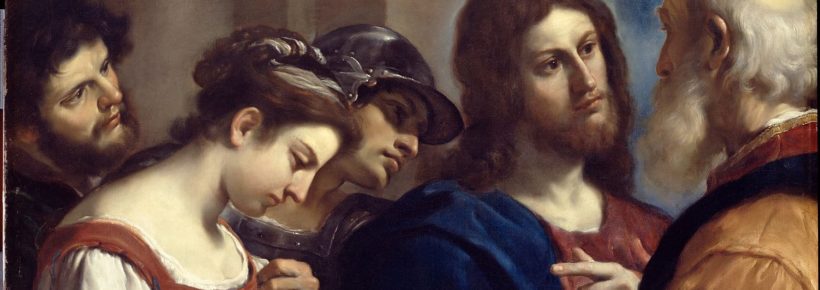 Since the beginning of time, the relationship between man and woman has rightfully held a significant importance. Nowhere is that truer than within the Catholic Church, which has continually sought not only to understand but to teach the beauty and the special oneness that comes from the unity of man and woman, especially in regard to Holy Matrimony. The Theology of the Body quotes below are just a snapshot of the deep meaning behind this relationship.
Since the beginning of time, the relationship between man and woman has rightfully held a significant importance. Nowhere is that truer than within the Catholic Church, which has continually sought not only to understand but to teach the beauty and the special oneness that comes from the unity of man and woman, especially in regard to Holy Matrimony. The Theology of the Body quotes below are just a snapshot of the deep meaning behind this relationship.
From 1979 to 1984, in his Wednesday audiences, St. John Paul II spoke to this relationship. Called the “Theology of the Body,” these talks have since been compiled into a cohesive document, studied extensively, taught, and reflected upon. The “Theology of the Body” is important because it welcomes us into a fuller understanding of how Christ sees the human body and of how man and woman fit together beautifully when both strive to fulfill His will.
St. John Paul II’s talks covered such topics as the real purpose of life, creation as the perfect act of love, the sanctity of the marital union, love as the gift of self, the dignity of the human person, and more.
Throughout these more than 300 pages of text, you will find immense wisdom. St. John Paul II’s insight and the beauty and power of his words invite you to join in the understanding of the dynamics among man, woman, and God. The quotations below are just a small sampling of what you will find. After each quotation, we have included a short explanation to help you contemplate the pontiff’s holy words.
1) When God-Yahweh said, “It is not good that man should be alone,” (Gen. 2:18) he affirmed that “alone,” man does not completely realize this essence. He realizes it only by existing “with someone”—and even more deeply and completely—by existing “for someone.”
When God created man, He understood that man could not be alone on this earth; he needed a companion. The other creatures of the earth could never offer man the gift of mutual giving that he would need from a relationship. Only another human being could offer that. Thus, God gave him a partner—someone who could fit beautifully and wholly with him and someone who would treasure him as a gift from God. Man now had a purpose—to love and be loved.
2) The human body, with its sex, and its masculinity and femininity seen in the very mystery of creation, is not only a source of fruitfulness and procreation, as in the whole natural order. It includes right from the beginning the nuptial attribute, that is, the capacity of expressing love, that love in which the person becomes a gift and—by means of this gift—fulfills the meaning of his being and existence.
Giving a gift is oftentimes more exciting than receiving one. When you give a gift to someone you love, you watch intently as he opens it to see his reaction. You want him to cherish and appreciate that gift. You want him to feel thankful. So it is with our bodies. Our bodies are an incredible gift given to us by God. As scripture teaches, they are temples of the Holy Spirit. God has given us this gift to care for and cherish. And part of cherishing that gift is treating it with dignity and respect. You would not walk up to someone on the street and hand him a precious gift; no, the person would not understand that gift. Likewise, you must only give the gift of the fullness of yourself to one who will appreciate and treasure it within a marriage.
3) Happiness is being rooted in love. Original happiness speaks to us of the beginning of man, who emerged from love and initiated love. That happened in an irrevocable way, despite the subsequent sin and death. In his time, Christ will be a witness to this irreversible love of the Creator and Father, which had already been expressed in the mystery of creation and in the grace of original innocence.
Because of the fall, we were all born with Original Sin, yet God in His goodness, through our baptism, washed that sin away. He did this out of great love for us. He did this so we could live in fullness with Him, not only here on earth, but eventually in heaven, where we will experience the ultimate happiness. The peace and happiness felt by the first man and woman before sin is the same peace and happiness we will feel upon looking upon God’s beatific face.
4) It is one thing to be conscious that the value of sex is a part of all the rich storehouse of values with which the female appears to the man. It is another to “reduce” all the personal riches of femininity to that single value, that is, of sex, as a suitable object for the gratification of sexuality itself.
Human beings have immense value—a value that goes far beyond that of mere sexuality. What a man and woman offer each other within a marriage and a marital embrace encompasses so much more than just their sexuality. This storehouse of values includes a oneness, a closeness, the melding of both mind and body, and the desire of each to truly care for the other—spiritually, emotionally, and physically. But when a man uses a woman (or a woman uses a man) for just sexual gratification, he debases her value and reduces her to a mere toy.
5) Adultery committed in the heart can and must be understood as “devaluation,” or as the impoverishment of an authentic value. It is an intentional deprivation of that dignity to which the complete value of her femininity corresponds in the person in question.
When Christ spoke of committing adultery in the heart, He knew the ramifications. We must remember that love is not just a feeling, but a decision. When a man looks lustfully at another woman, he is treating that woman—and his wife—like objects that exist solely to fulfill a desire. He cheapens what he shares with his wife, and he cheapens his wife.
6) Man must feel called. . . to realize the nuptial meaning of the body. He must feel called to express in this way the interior freedom of the gift, that is, of that spiritual state and that spiritual power which are derived from mastery of the lust of the flesh.
God does not deny that temptations of the flesh are often difficult to overcome. Yet He demands we do so anyway. Man’s call is to become a gift—a nuptial blessing—to another. Though this can be as a celibate priest in union with the Church, as a lay person who remains celibate, it can also be as a spouse. In all of these roles, man must fight against the desires to give in to the needs of the flesh. He must understand that he will never fully realize the true meaning of the nuptial blessing if he were to give in. True mastery of the lust of the flesh will come through God’s grace, through prayer, through discernment, and through a strong will.
7) Nothing from outside makes one filthy, no “material” dirt makes one impure in the moral, that is, interior sense. No ablution, not even of a ritual nature, is capable in itself of producing moral purity. This has its exclusive source within man. It comes from the heart.
Christ teaches that purity comes from the heart. He doesn’t, however, say it’s easily attainable. For that, we must work. We must strive to maintain the purity we had as small children, knowing that our bodies and our very selves are immense gifts to be treasured. When we lust after someone, we debase him and turn him into a mere object of desire. This lust, which is the exact opposite of love, grinds away at the inherent dignity in all of us.
8) If mastery in the sphere of ethos is manifested and realized as “love, joy, peace, patience, kindness, goodness, faithfulness, gentleness, self-control”—as we read in the Letter to the Galatians—then behind each of these realizations, these ways of behaving, these moral virtues, there is a specific choice, that is, an effort of the will, the fruit of the human spirit permeated by the Spirit of God, which is manifested in choosing good.
Life is full of choices. We can choose to do evil. We can choose to hurt others. We can choose to live only for ourselves. But only when we choose to do good will we realize the virtues of love, joy, peace, patience, kindness, goodness, faithfulness, gentleness, and self-control. Only out of goodness can good things grow.
9) The fruit of redemption is the Holy Spirit, who dwells in man and in his body as in a temple. In this Gift, which sanctifies every man, the Christian receives himself again as a gift from God. This new, double gift is binding. [St. Paul] refers to this binding dimension when he writes to believers, aware of the Gift, to convince them that one must not commit unchastity. One must not sin “against one’s own body.” . . . He writes: “The body is not meant for immorality, but for the Lord, and the Lord for the body” (1 Cor. 6:13).
Indeed, we are temples of the Holy Spirit. He dwells within us; He knows all that we do and all that we say. Our bodies and our lives were given to us as a beautiful gift and bought at a price—the price of Christ’s death on the cross. And so we must treat this gift reverently, for someday our bodies will return to Christ, and He will ask for an accounting of how we treated it.
10) [Marriage] is the sacrament in which man and woman, called to become “one flesh,” participate in God’s own creative love. They participate in it both by the fact that, created in the image of God, they are called by reason of this image to a particular union (communio personarum), and because this same union has from the beginning been blessed with the blessing of fruitfulness (cf. Gen. 1:28).
Participating in God’s creative love is both a beautiful image and an immense responsibility. When a husband and wife create a child, we call this procreation. Why? Because they are creating a new human being in conjunction with God. They have the awesome opportunity to participate with Him in the act of creation. They not only trust in God, but they give themselves up to His will.
11) Love excludes every kind of subjection whereby the wife might become a servant or a slave of the husband, an object of unilateral domination. Love makes the husband simultaneously subject to the wife, and thereby subject to the Lord himself, just as the wife to the husband. The community or unity which they should establish through marriage is constituted by a reciprocal donation of self, which is also a mutual subjection.
When a couple marries, one person is not greater than the other. One should not dominate the other. But their mutual love and the desire to give of self should make both want to be subject to the other. In that mutual subjection, you find no dominance. You find no feelings of possession. You find two people willing to serve each other as they give equally of themselves and realize the fullness of their union.
St. John Paul II’s words encourage us, enlighten us, and help us understand why God said “It is good” after He created man and woman. It is good, but only if we choose to make it good. It is good when we live God’s way.
Reading and understanding these quotations is like dipping your toe in the water and creating a small ripple. Knowledge has been unleashed, and now change can take place. This change has immense potential as it ripples outward. Just imagine what could happen when you follow these words completely and live in fullness with your spouse, sharing the love Christ intended.
Related Content
Susan Ciancio has a BA in psychology and a BA in sociology from the University of Notre Dame, with an MA in liberal studies from Indiana University. Since 2003, she has worked as a professional editor and writer, editing both fiction and nonfiction books, magazine articles, blogs, educational lessons, professional materials, and website content. Fourteen of those years have been in the pro-life sector. Currently Susan writes weekly for HLI, edits for American Life League, and is the editor of its Celebrate Life Magazine. She also serves as executive editor for the Culture of Life Studies Program, an educational nonprofit program for k-12 students.


















